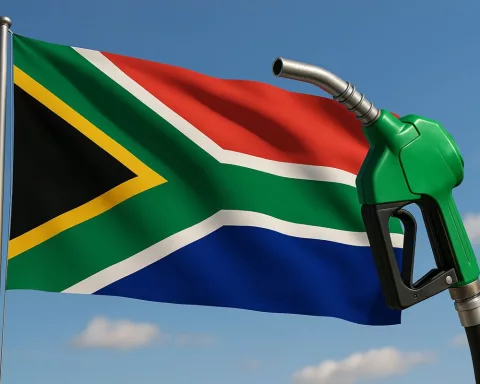South Africa’s fuel prices are subject to a complex web of factors, including the international oil market, exchange rates, taxes, and levies. The government’s “slate levy” system aims to balance global and local fuel prices, while regional differences also impact the cost of fuel. Changes in fuel prices have a significant impact on the economy and household budgets, with social media platforms reflecting public sentiment on the issue. Despite the uncertainty of the volatile oil market, South Africans remain resilient in the face of fluctuating fuel costs.
South Africa’s economy and its bustling city, Cape Town, remain highly attuned to the ever-fluctuating rhythm of fuel prices. While recent relief from the plummeting petrol and diesel prices is still fresh in the memory of motorists, the determination of fuel costs is a labyrinthine world of factors.
The Complex Foundation of Fuel Prices
South Africa’s fuel pricing mechanism is determined by a complex foundation of several elements. Foremost among these is the international oil market, given the country’s significant dependence on imported crude oil. The Rand’s exchange rate with the Dollar also greatly influences prices, owing to the global oil trade being dollar-denominated. These factors find their mathematical expression in the Basic Fuel Price (BFP) mechanism, a critical tool in calculating costs.
The Impact of The Government’s “Slate Levy” System
South Africa’s fuel pricing system is also impacted by the government’s “slate levy” system, which aims to harmonize disparities between global and local fuel prices. This is achieved through imposing charges on or granting credits to fuel companies. Geographic variations also reflect in regional fuel costs, with coastal regions generally using costlier 95 octane, while inland regions favor the slightly less expensive 93 octane.
Taxes and Levies
Taxes and levies add further complexity to the fuel price equation. The General Fuel Levy supplements the national treasury, while the Road Accident Fund Levy provides assistance to road accident victims. Custom and Excise taxes are applied to certain fuel products. Interwoven with the BFP, these measures together set the stage for the final fuel prices that motorists encounter at the petrol stations.
Impact on the Economy and Social Media
Frequent changes in fuel prices send waves throughout the economy, modifying transportation expenses, altering the prices of goods and services, and ultimately influencing inflation and household budgets. Social media platforms also reflect these sentiments about fuel prices, with conversations ranging from the serious impact on student living expenses to the exaggerated luxury vehicle prices in Zambia. Twitter users voice their dismay, inject humor, and critique how changes in petrol prices affect everyday life, from utility bills to the cost of electric vehicles (EVs).
South Africans’ Response to The Volatile Oil Scenario
Recent tweets regarding petrol price trends expose an amalgam of frustration and relief among South Africans. The drop in fuel prices has elicited a collective sigh, albeit tinged with cynicism towards the future. The online conversation navigates through broader economic discussions, personal finance advice, and a mixture of humor and concern. Each tweet offers a glimpse into the nation’s pulse on the volatile oil scenario.
While South Africans may currently enjoy the relief of reduced petrol prices, the journey ahead is at the mercy of international markets and national economic policies. Cape Town and the rest of the country will continue to respond to these shifts, demonstrating resilience amidst uncertain economic winds. For ongoing updates on fuel price movements and their ripple effects on the Rainbow Nation, keep following CapeTown.today.
What factors determine South Africa’s fuel prices?
South Africa’s fuel prices are determined by a complex web of factors, including the international oil market, exchange rates, taxes, and levies. The Basic Fuel Price (BFP) mechanism is a critical tool in calculating costs.
How does the government’s “slate levy” system impact fuel prices?
The government’s “slate levy” system aims to harmonize disparities between global and local fuel prices by imposing charges on or granting credits to fuel companies. Additionally, geographic variations reflect in regional fuel costs, with coastal regions generally using costlier 95 octane, while inland regions favor the slightly less expensive 93 octane.
What taxes and levies are associated with fuel prices in South Africa?
Taxes and levies add further complexity to the fuel price equation, including the General Fuel Levy, Road Accident Fund Levy, and Custom and Excise taxes. These measures, interwoven with the BFP, set the stage for the final fuel prices that motorists encounter at the petrol stations.
What is the impact of frequent changes in fuel prices on the economy and social media?
Frequent changes in fuel prices send waves throughout the economy, modifying transportation expenses, altering the prices of goods and services, and ultimately influencing inflation and household budgets. Social media platforms also reflect these sentiments about fuel prices, with conversations ranging from the serious impact on student living expenses to the exaggerated luxury vehicle prices in Zambia.
How do South Africans respond to the volatile oil scenario?
Recent tweets regarding petrol price trends expose an amalgam of frustration and relief among South Africans. The drop in fuel prices has elicited a collective sigh, albeit tinged with cynicism towards the future. The online conversation navigates through broader economic discussions, personal finance advice, and a mixture of humor and concern.












